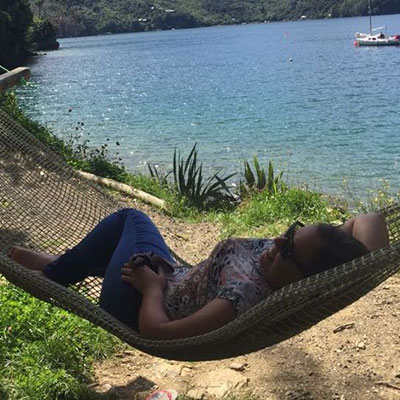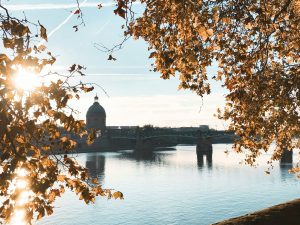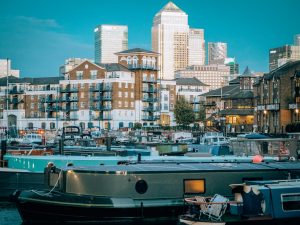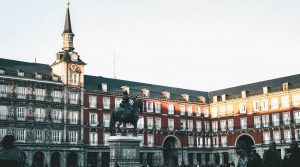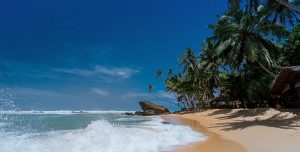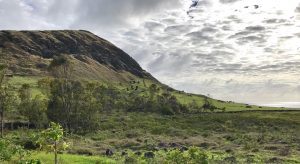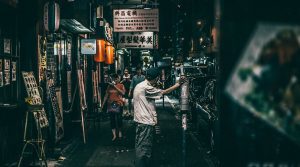Written From… a blind lesbian traveller currently in New Zealand
The Fiji Islands have always been a bucket list destination for us and we finally got to visit in January 2018, while on a year’s sabbatical. Surprisingly, we had a really mixed experience. Here’s why, together with 10 Fiji Islands travel tips to know before you go.
Fiji islands – 332
This Fiji Islands are actually made up of 332 different islands. I honestly didn’t know this before I started doing some research. While only one-third are populated, that’s still a lot to choose from. Viti Levu is the main island, containing three quarters of the population, Nadi international airport and Suva – capital of fiji.
Apart from Viti Levu, the 2 key island groups popular with tourists are the Mamanucas and Yasawas, which are easily accessible from Nadi, via the Yasawa Flyer ferry which leaves once a day at 8:30AM.
The Flyer heads north in the morning, stopping at each island before turning around and coming back south in the afternoon. We stayed on Viti Levu for 4 nights and then headed north to spend 2 nights on Waya Lailai and another 3 on Nacula in the Yasawas.
Local hotels
If you decided to stay in Fijian local hotels, rather than large chain hotels, food choice is limited. In local hotels we weren’t given much choice over what, or when we ate, but rather were treated like a big family, with set meal times and food served up for us. Dietary requirements are obviously considered, but that’s about it.
Hotels in Fiji
In the Fiji Islands there’s a huge range of accommodation from hostels to destination resorts. On our trip, we experienced a fair spectrum of accommodation and different hotels in Fiji. The first night we stayed in a hostel and while it was cheap and buzzing, the bed was hard and springy, the cleanliness was questionable and the breakfast was atrocious.
The next 2 nights we spent at Naqalia Lodge on Waya Lailai Island, which was a mid-range resort ran by local Fijians. It was rustic and still fairly basic, but it was clean, the food was decent, the beach was lovely and there were activities on offer, including walks and snorkelling trips. We also got the most wonderful Fijian welcome here and participated in our first Kava ceremony.
We then headed to Nacula Island in the far north to spend 3 nights at a Fijian Homestay. Unfortunately, this wasn’t the experience we’d been hoping for. While we expected the facilities to be basic, we payed £100 a night and were given a dirty, bug-infested room where we were bitten to death at night.
The bathroom was a tin shack with a cockroach-infested shower, no sink and a toilet which mostly didn’t flush. There was no electricity except a generator which was switched on for cooking, the food was awful and it poured with rain which didn’t help.
The family didn’t seem interested in engaging with us either and it was clear they were hosting us for the money, which we doubted they saw much of. The whole thing felt like a scam, for both sides.
This very much detracted from the trip for us and we left a day early feeling sad and disappointed. If you do want to experience a Homestay, do lots of research beforehand – hopefully ours was an uncommon experience.
With no clean underwear, soaking wet clothes from the rain and feeling generally dirty, we wanted somewhere clean and comfortable to spend our last 3 nights. So we bagged a last minute deal at the Radisson Blu for 2 of them and stayed at the mid-range Fiji Gateway for the final night.
We didn’t experience the upper end of the market while we were there as we simply couldn’t afford it, but if you want completely pampered luxury, you can definitely find it.
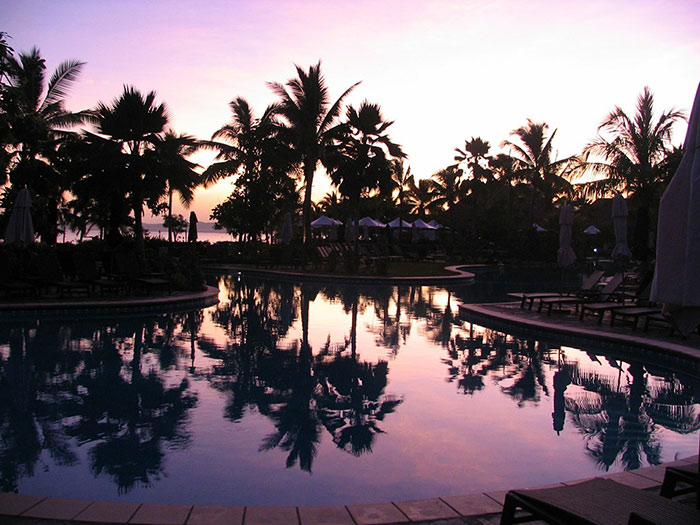
Flexible accommodation
Book flexible accommodation with free cancellation and arrange your boat transfers when you arrive. On the day we were due to leave Australia, our previous destination, we awoke to very stormy weather. First our flight was delayed, then it was cancelled altogether and we left almost 24 hours later.
This meant we lost 2 night’s accommodation, plus our pre-booked boat transfer. While we were able to rearrange the transfer free of charge, the rooms were pre-paid and we couldn’t get the money back for those. However, there’s usually plenty of space on the boat, so I’d advise booking yours when you get there and book rooms with free cancellation in case you get delayed.
Fiji Dollar
Buy your Fiji Dollars and a data sim at Nadi airport. When we arrived in Nadi, we were so preoccupied with rearranging our boat transfer that we forgot to buy a data sim at the airport. This was a big mistake, as wifi is both sketchy and mostly at a cost on Fiji Islands. This caused problems later when we needed to leave our Homestay early.
We also discovered we should have waited until we got there to exchange our currency. We could have got a much better rate at Nadi airport than we did in Australia.
Fijian language
Learn how to say hello and thank you in the Fijian Language. These 2 key Fijian words which you should learn before you go are Bula and Vinaka. Bula is the general greeting which everyone uses and Vinaka is thank you. These 2 words will go a long way and by the time we left Fiji, we must have said them a hundred times.
As we approached Naqalia Lodge in the Yasawas by boat, the crew told us that we would be greeted with a huge “Bula” from the Fijians on the shore and that we should shout back as loudly as we could. As the boat drew closer and the engine was cut, the sound of an acoustic guitar and multiple Fijian voices singing in harmony floated across the water.
It was very moving. I was glad I was wearing sunglasses. After spending over 3 months away from home, it felt good to be welcomed like this. As we reached the shore, the staff – seeing that I was blind – decided to carry me off the boat.
Normally I would object to being manhandled in such a way, but on this occasion, I didn’t mind. As I was set down on the sand, I was immediately hugged by numerous Fijians. “Welcome home,” they said.
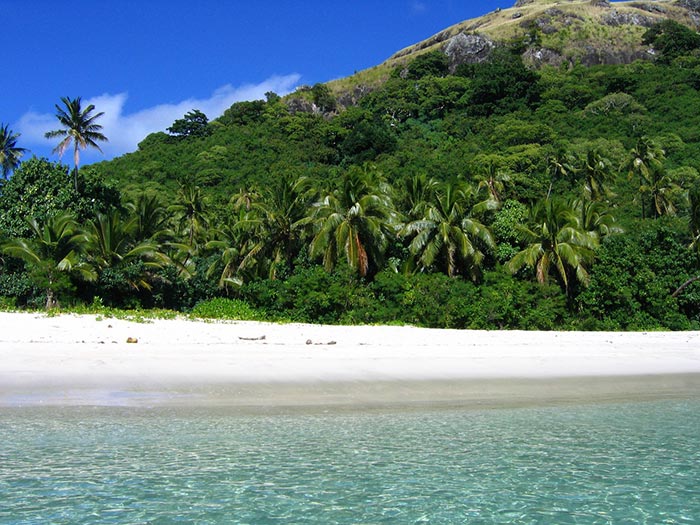
Gay travel
If you’re a gay traveller, prepare to go back in the closet. So now you know I’m blind. But I have to out myself twice as not only do I have a disability, I’m also gay. More or less from the moment my wife and I arrived in Fiji we got the vibe that same sex relationships weren’t widely acknowledged or accepted.
Time and time again we were questioned regarding the nature of our relationship and there were 2 choices. Friends or sisters. No-one, not one person, ever suggested anything else and that’s because homosexuality isn’t widely accepted in Fijian society.
At our hostel, the receptionist was very flustered when checking us in. Eventually, she revealed that this was because they only had a room with a double bed left. We had to insist emphatically that this was completely fine and that we honestly didn’t mind. At the Fijian Homestay, the family were very religious, insisting on praying before we ate and with bible passages hung all over their walls. No coming out there then either.
While my wife, having grown up in South Africa and not coming out until she was in her 30s, was a bit less bothered by this, I hated it. I came out when I was very young and have always refused to apologise for who I am, or hide my relationships.
One day while at Naqalia Lodge, my wife went out snorkelling and I stayed behind to read and relax. One of the male staff came over to chat and we got in to a conversation about my life back home. First he asked questions about my sight loss, then he started asking about my living situation.
I told him that I lived with the friend who I was here with, but then he noticed my wedding ring. “So what about your husband?” he said, a little confused and while I could have said we all shared a house or some such nonsense, I decided to bite the bullet and come out.
“I don’t have a husband,” I said, “I have a wife.”
“So,” he said slowly, “you are married to your friend, who is a woman?” I nodded. “Wow!” he said, seeming genuinely amazed. “I’ve never seen this before, only in movies. Can I ask you some questions?”
“Within reason,” I said cautiously.
Over the next hour or so, while he cracked open coconuts so that we could both drink the milk, I told him about my life and my marriage and he told me that not many people were were openly gay in Fiji, especially on the smaller islands.
He said that most women were pressured in to marriage by their families and I asked what would happen if a woman didn’t want to get married. He said that this might be ok, but that she would struggle to be openly gay.
I think part of the reason why I personally had such a mixed experience of Fiji, was precisely for this reason. I couldn’t put my arm around my wife, or hold her hand. We couldn’t acknowledge our relationship and that made me sad and angry. Luckily, the man I did tell was more curious than anything else, and so it went ok, but it could have easily turned out differently.
Kava drink
It’s tradition in Fiji Islands to drink Kava. The Kava drink is Fiji’s national drink and in most places you stay (especially in the Yasawas), you’ll be expected to participate in a Kava ceremony. You may also be required to present a piece of Kava root to the chief of the local village.
The root is ground up and sieved through a cloth into water which is then served up to drink. Honestly, it’s pretty gross and tastes like slightly-spiced mud. Kava plant has mild narcotic properties – it numbs the mouth and, if drank in enough quantities, will make you fall into a deep sleep. Many Fijians drink Kava every night, so it’s easy to see why they operate on Fiji time.
If you do stay in a place where you need to present Kava to the local Chief, the root can be bought from the local market in Nadi and you can expect to pay around FJ$120 per kg, although 250g will be enough. Don’t take Kava powder, this is frowned upon.
Prepare for anything
During our 10 day trip we experienced beautiful sunshine, torrential rain, weird and wonderful food, insect bites like never before, all manner of boats and traditional Fijian culture.
The sense of community in Fiji is strong and tourists are considered very much a part of that. There’s something for every type of traveller in Fiji, just do plenty of research and think carefully about what you want to get out of the experience before you go.
Would we visit again? Absolutely – who could resist that Fijian welcome?
